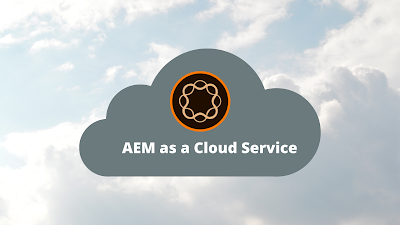Formerly referred to as the Uberjar. Adobe announced today that Adobe Experience Manager AEM is now available as a cloud-native SaaS application.
 Aem As A Cloud Service Now Supports Vpn Connectivity Opsinventor
Aem As A Cloud Service Now Supports Vpn Connectivity Opsinventor
During the update of AEM as a Cloud.

Aem as a cloud service. Each AEM as a Cloud Service tenant exists within its own isolated namespace including its own networking policies computing and storage. Especially in terms of AEM Assets as a Cloud Service it solves few of the major problems like Asset Upload download limit as well as performance and Asset Processing Asset Microservices. 13 rows This guide provides an summary of how to get started with Experience Manager as a Cloud.
Provides Continuous Delivery and Continuous Integration for updates with zero downtime. The code must be resilient especially as an instance might be stopped at any point in time. Cloud Service makes it easy to scale as your business grows.
AEM as a Cloud service has been recently made GA and looks very promising in terms of performance scale and standardization. AEM as a cloud service brings automatic backup and improved disaster recovery models that offer stronger reliability. AEM as a Cloud Service Author Publish tiers get fronted with Fastly updated July 29 2020 with current data from Adobe docs The Fastly CDN is a default part of AEM as a Cloud Service with Sites and Assets Author traffic as well as the public-facing Publish traffic being fronted by Fastly.
In AEM as a Cloud Service the instances are continually updated by Adobe and managed in transient containers in the cloud. AEM as a Cloud Service is a native cloud solution or so-called Software as a Service SaaS. The out-of-the-box non-customized AEM Sites deployed as a Cloud Service has been scoped to support a specified number of Concurrent Users as detailed in the description of AEM Sites based on the average User-driven load placed on the Production Environment.
AEM Adobe Experience Manager is now available as a Cloud Service and has the following benefits. Quickstart Jar - The AEM runtime used for local development. It wont be possible to move the services to another cloud provider.
The AEM as a Cloud Service security model includes tenant- and node-level isolation for all services. Adobe entirely operates the infrastructure needed to run this service with Microsoft Azure. The AEM as a Cloud Service SDK is comprised of the following artifacts.
Java API Jar - The Java JarMaven Dependency that exposes all allowed Java APIs that can be used to develop against AEM as as Cloud Service. If you want to upload files into AEM you should use the aem-upload library. AEM as a Cloud Service Development Guidelines.
Is based on a dynamic architecture that autoscales thus removing infrastructure considerations. The fundamentals of code development are similar in AEM as a Cloud Service compared to the AEM On Premise and Managed Services solutions. The Cloud Service environment is preconfigured and tested to meet enterprise security best practices and industry-recognized certifications.
AEM Forms is available as a Cloud Service. Its also protected against outages and disasters with built-in redundancy and proactive monitoring. AEM Forms as a Cloud Service.
AEM as a Cloud Service is a yet-to-be-generally-released service offering from Adobe which is the next evolution of a managed AEM offering after Adobe Managed Services. Deploying to AEM as a Cloud Service Introduction. This means that there is always more than one instance running.
This drastically differs from the classic model where either the customer or Adobe Managed Services would deploy a known released version of AEM to a virtual machine running in the cloud. Developers write code and test it locally which is then pushed to remote AEM as a Cloud Service environments. In essence AEM as a Cloud Service involves Adobe automatically provisioning and managing AEM instances running in Docker containers orchestrated by Kubernetes backed by a shared nodefile store and a new provisioning model.
AEM Forms is a ye olde product that was earlier the Adobe LiveCycle server product which then later was a server-within-a-server product that shoehorned massive amounts of adaptive forms PDF generation and document-of-record functions as well as a whole host of supporting open source OS packages onto a very capable very complicated product that was NOT. Is the cloud-native way of leveraging the AEM applications. The ability to integrate AEM with other solutions in the Marketing Cloud Experience Cloud or other third-party solutions remains largely the.
The AEM as a Cloud Service SDK. Code running in AEM as a Cloud Service must be aware of the fact that it is always running in a cluster. Prior to this it was available on premises or as a managed service.
In general think twice before you open an InputStream in AEM. The cloud-native edition of AEM Forms allows you to quickly get started with AEM Forms to build beautiful data capture experiences without setting up. AEM as a Cloud Service itself the JVM should not be bothered with streaming binary data into and out of the JVM.









